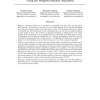Free Online Productivity Tools
i2Speak
i2Symbol
i2OCR
iTex2Img
iWeb2Print
iWeb2Shot
i2Type
iPdf2Split
iPdf2Merge
i2Bopomofo
i2Arabic
i2Style
i2Image
i2PDF
iLatex2Rtf
Sci2ools
116
click to vote
ECCC
2010
2010
Regret Minimization for Online Buffering Problems Using the Weighted Majority Algorithm
Suppose a decision maker has to purchase a commodity over time with varying prices and demands. In particular, the price per unit might depend on the amount purchased and this price function might vary from step to step. The decision maker has a buffer of bounded size for storing units of the commodity that can be used to satisfy demands at later points in time. We seek for an algorithm deciding at which time to buy which amount of the commodity so as to minimize the cost. This kind of problem arises in many technological and economical settings like, e.g., battery management in hybrid cars and economical caching policies for mobile devices. A simplified but illustrative example is a frugal car driver thinking about at which occasion to buy which amount of gasoline. Within a regret analysis, we assume that the decision maker can observe the performance of a set of expert strategies over time and synthesizes the observed strategies into a new online algorithm. In particular, we investi...
Related Content
| Added | 10 Dec 2010 |
| Updated | 10 Dec 2010 |
| Type | Journal |
| Year | 2010 |
| Where | ECCC |
| Authors | Melanie Winkler, Berthold Vöcking, Sascha Geulen |
Comments (0)

